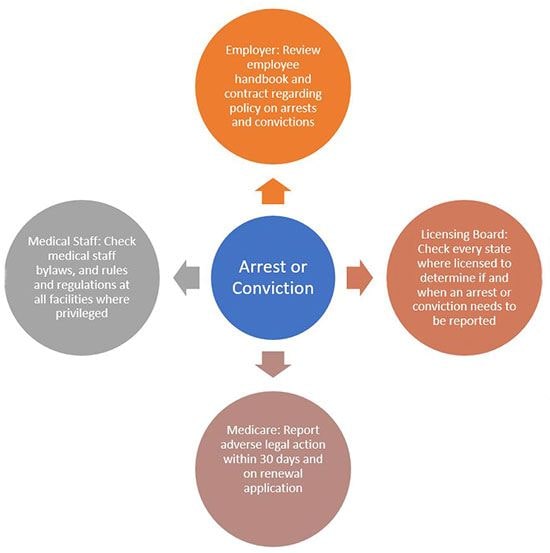When Health Care Workers Are Arrested: Health, Criminal, and Employment Law Issues
When Health Care Workers Are Arrested: Health, Criminal, and Employment Law Issues
It is a situation that can happen: a licensed health care professional is arrested for a first-offense operating while intoxicated (OWI), and they immediately hire a criminal defense attorney.
A first-offense OWI is not a criminal offense in Wisconsin, but rather a traffic violation. Depending on the county, the case may not even show up in CCAP (the Wisconsin Circuit Court Access Program).
The health care professional wants to resolve the case quickly, so they stipulate to a guilty plea. The client may not even have to show up to court, because this can all be done electronically or via fax – an ideal resolution for a busy health care professional.
And since the case is not on CCAP, their employer and the Department of Safety and Professional Services (DSPS) never needs to know about this little misstep, right?
Wrong.
The Obligation to Report an Arrest or Conviction
When a licensed health care professional is arrested for any offense, the first question is “does the arrest need to be reported to their employer?”
A thorough review of the employee handbook is required to determine if an obligation to report the arrest exists. If the individual has hospital privileges, it is also necessary to review the medical staff bylaws.
A licensed health care professional is not required to report an arrest if no obligation exists, but a failure to report when required could result in significant consequences, including termination. Many hospital systems run annual or biannual criminal background checks on employees. Most likely, an arrest for an OWI-first offense will show on a background check. This new information could trigger an investigation into why the licensed health care professional failed to disclose the arrest.
An additional consideration are the circumstances surrounding the arrest. If a licensed health care professional is arrested for an OWI-first on their weekend off, following a night out with friends, most likely DSPS or an employer will not be concerned or take any adverse action.
On the other hand, if the licensed health care professional is arrested on their way to work or while on call, this situation could be viewed as being “substantially related to the practice of medicine.” This finding could result in consequences from the employer as well as DSPS.
Even if the licensed health care professional does not have an obligation to report an arrest to their employer, a conviction for an OWI-first offense (or other law violations) may need to be reported. Again, a thorough review of the employee handbook and medical staff bylaws is required to determine if a reporting obligation exists.
When to Report an Arrest or Conviction
Another common question is whether a licensed health care professional has an obligation to report an OWI-first conviction to their respective licensing board.
Under Wis. Stat. section 440.03(13)(am), only misdemeanor or felony convictions require self-reporting within 48 hours. An OWI-first offense does not need to be immediately self-reported because it is not a misdemeanor or felony conviction in Wisconsin.
An OWI first offense, however, needs to be reported on a new or renewal application. DSPS is given broad authority under Wis. Stat. chapter 440. This authority allows DSPS to investigate any arrest or conviction (including violations of local law) of an initial and renewal applicant.1
If the case is not resolved, it still needs to be disclosed on any professional licensing application. DSPS also requires the licensee to provide police reports, copies of the citations or criminal complaints, as well as any court ordered AODA assessments as allowed under section 440.03(13)(a).

In reviewing these reports, DSPS determines whether the arrest or conviction is substantially related to the practice of medicine, and if so, a licensed health care professional could face a public monitoring order. If the licensed health care professional’s attorney believes that DSPS may find that the arrest or conviction is substantially related to the practice of medicine, alternative resolutions can be pursued, including an application into the Professional Assistance Procedure program, which could prevent a public adverse action for the licensed health care professional.
Reporting a Criminal Arrest or Conviction
Of course, the above scenario deals with an OWI-first offense – a reportable, but noncriminal matter. Further issues may arise when the arrest or conviction is for a misdemeanor or felony conviction, especially offenses involving drugs or crimes against a person.
For these offenses, the licensed health care professional may have to report an arrest or conviction to their employer, and they will have to report any pending case on their renewal application.
As noted above, a misdemeanor or felony conviction must be reported to DSPS within 48 hours under section 440.03(13)(am). Further complicating matters is that, once a licensed health care professional reports their conviction, it may be weeks or months before DSPS responds. If the renewal period falls within the time that a conviction has been reported but before DSPS acts on the self-report, the licensed health care professional still has an obligation to report the conviction on their renewal application.
An additional consideration is when the criminal allegation involves controlled substances and the licensed health care provider holds a Drug Enforcement Administration (DEA) registration. Both the DEA and the U.S. Department of Justice are federal agencies, and these agencies talk to one another. Before a criminal case is even resolved, the DEA may move to revoke a prescribing health care provider’s registration, if it believes the alleged conduct may threaten the public health and safety under 21 U.S.C. §823(f)(5).
The DEA and DSPS also share information. If a health care provider’s license is disciplined for improperly prescribing controlled substances, the DEA may move to limit or revoke the individual’s registration as allowed under 21 U.S.C. §823(f)(1).
A Conviction May Also Need to Be Reported to Medicare
If a physician or a nonphysician practitioner is a Medicare provider, a misdemeanor or felony conviction presents another reporting requirement.
Under 42 CFR §424.516, a physician or a nonphysician practitioner must report an adverse legal action within 30 days. Of concern for Medicare are those convictions that involve fraud, obstructing an investigation, or controlled substances.
Failing to report an adverse legal action could result in the revocation of the licensed health care professional’s Medicare billing privileges. This situation can snowball if a provider fails to report the conviction within 30 days and then fails to report it on their renewal application.
Considerations for a criminal law attorney in representing a licensed health care professional is that certain felony convictions are considered per se detrimental to Medicare recipients, resulting in a minimum 10-year ban in the program.
Additional Consequences of Criminal Convictions
The National Practitioner Data Bank (NPDB) is another consideration for any licensed health care professional. A state law enforcement agency is required to report an adjudicated action against a health care provider, this includes criminal convictions. If an arrest or conviction results in an adverse action taken by DSPS, that too is reportable to NPDB. Medicare billing privileges being revoked are also reportable to the NPDB.
A final consideration is that, when the health care provider is licensed in other states, an arrest or conviction may need to be reported to that state’s licensing board. If DSPS acts against a license holder due to a criminal conviction, that adverse action may also be required to be reported to the other state.
Conclusion: Communication Is Key
Clearly, an arrest or conviction for a licensed health care provider has far reaching consequences -- see Fig. 1 above for guidance. Criminal attorneys representing health care professionals need to have an understanding of employment law as well as health law. Similarly, many employment and health law attorneys do not always have an understanding of criminal law.
Just as physicians consult with other physicians when treating complex cases, attorneys need to consider consulting with other attorneys when representing licensed health care professionals. A failure to fully understand all of the consequences a licensed health care professional faces when dealing with a legal issue could prove to be harmful to not only the license holder, but also the representing attorney.
Endnote
1 Wis. Stats. §440.03(13)(a) and (b).
This article was originally published on the State Bar of Wisconsin Health Law Blog.

 By
By 





